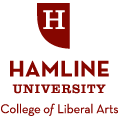Date of Award
Spring 2017
Degree Type
Restricted Access Honors Project
School
College of Liberal Arts
First Advisor
Jodi Goldberg
Abstract
Cancer is the result of multiple mutations within an individual’s genome. Each tumor has its own unique genetic makeup, even among different tumors of the same tissue (e.g. breast cancer). Researchers are now working to understand the genetics of cancers to develop novel and effective treatments directed towards tumors that carry mutations of specific genes that drive cancer. Dorr et al., used transposon-based mutagenesis to identify multiple driver genes believed to play a significant role in lung cancers. One of these genes was CUL3, a gene that plays a critical role in the polyubiquitination and degradation of specific proteins. Previous work in our lab knocked-out CUL3 from the human HCT116 colorectal cancer cell line using CRISPR/Cas9. Upon knockout, the cells displayed a variety of phenotypic changes including alteration in cell size and growth rates as measured by metabolic assays. Three of five mutant cell lines showed evidence of higher metabolic activity over the HCT116 parental cell line despite dividing less frequently. In the current study, mutant cell lines also showed significant increases in metabolic activity when compared to the HCT116 parental with P-values < 0.01. In addition, cell size was measured to determine the average sizes of the parental and mutant cell lines using ImageJ software. Analysis showed that mutant cell lines were significantly larger than the HCT116 parental line with P-values < 0.01. These differences in cell size were not due to differential effects of the metabolic assay reagent on mutant and parental cells based on one-way ANOVA analysis of cell sizes in the presence or absence of the reagent (p values ranged from 0.26- 0.987).
Recommended Citation
Golafshan, Farhoud, "Investigating the Role of CUL3 in Phenotypic Changes and Metabolic Activity of HCT116 Colorectal Cancer Cells" (2017). Departmental Honors Projects. 61.
https://digitalcommons.hamline.edu/dhp/61
dc_type
text
dc_publisher
DigitalCommons@Hamline
dc_format
application/pdf
dc_source
Departmental Honors Project

